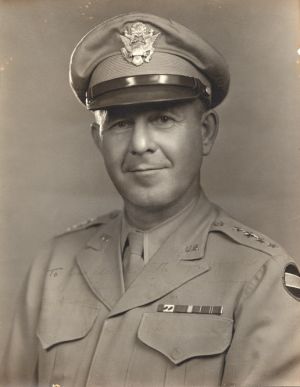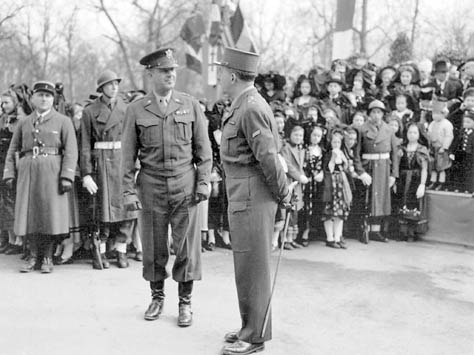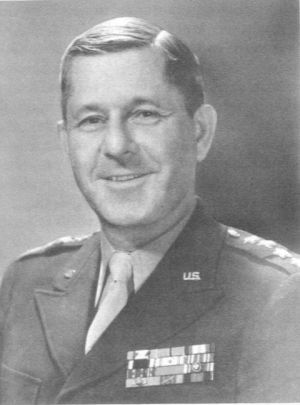Introduction
According to some historians, the American General Jacob Loucks Devers has remained undervalued for his achievements during the Second World War. For example, his campaign in the South of France is still relatively unknown. But some historians would especially like to see Devers get more credit for his campaign in the fall of 1944. At that time, many Allied units crashed. Market Garden failed and the fighting for Metz and the Hürtgenwald was deadlocked. The only Allied general who actually made progress was Devers. He was already on the banks of the Rhine in November. General Dwight Eisenhower, however, forbade him to cross the Rhine. The Allied advance then came to a complete standstill and the Germans were even able to counter-attack. The Rhine was only crossed in the spring of 1945. The course of the war could have been very different if Devers had not been stopped in November 1944.
Before the war
Jacob Loucks Devers was born on September 8, 1887 in the small town of York, Pennsylvania. He received a normal, solid upbringing from his parents, in which he learned that work must be done to achieve success. His parents also thought a sense of responsibility was also very important. After high school, Devers attended West Point military cademy. Here he graduated in 1905 as a classmate of General George Patton. Devers served as a 2nd Lieutenant in an artillery regiment in Hawaii. During World War I he was an artilleryman in France and Germany.
During the interbellum, Devers did a lot of research into the use of artillery. Partly thanks to his participation in these studies, a step forward was taken both technically and tactically. During the last period of the interbellum, Devers commanded an artillery regiment in Panama. As commander, he mainly emphasized training and preparation. According to Devers, these were the main methods of properly preparing a force for the coming battle. Devers also commanded Panama when World War II broke out.
Definitielijst
- interbellum
- “Latin: Between war”. Years between the Great War and World War 2.
- regiment
- Part of a division. A division divided into a number of regiments. In the army traditionally the name of the major organised unit of one type of weapon.
During the war
In May 1940 Devers was promoted to Brigadier-General and in October 1940 he was promoted again, now to Major-General. From November 15, 1940 to July 15, 1941, Devers commanded the U.S. 9th Infantry Division, which was then stationed at Fort Bragg Army Base in North Carolina. Devers was the youngest Major General of the United States Armed Forces. On August 14, Devers was transferred to Fort Knox, where he was given command of the armored forces. During the period that Devers was in command, the armored forces grew from 2 armored divisions to 16 divisions and 63 separate tank battalions. In September 1942, Devers was promoted to Lieutenant-General.
On May 3, 1943, the American commander in Europe, General Frank Andrews, died in a plane crash. Devers succeeded him and was given command of the troops in Europe. During the period that Devers held this position, he was mainly involved in training and preparing the troops for the crossing of the Channel, which would eventually take place in June 1944 as Operation Overlord. In December 1943, Devers had to transfer this position to General Dwight Eisenhower.
Devers was assigned no role during the landings in Northern France and he was given temporary command of the Allied forces in North Africa. In the meantime, he was busy planning an amphibious landing in the south of France to put even more pressure on the Germans. In July, Devers was given command of the U.S. 6th Army Group, consisting of 12 U.S. and 11 French divisions. Devers' army group landed on the French Mediterranean coast on August 15, 1944 during Operation Anvil-Dragoon. Devers then quickly advanced northwards and inflicted heavy losses on the German 19th Army. In mid-September, Devers' troops made contact with troops from Patton's 3rd Army at Dijon who had disembarked in northern France.
Devers' 6th Army Group advanced further eastward and in the fall of 1944 was virtually the only Allied force to gain ground. In November, the 6th Army Group had captured Strasbourg and was on the banks of the Rhine. Devers wanted to make the crossing, but this was banned by Eisenhower, who even wanted the 6th Army Group to withdraw from Strasbourg. However, Devers was able to prevent this. But now he too had been stopped.
When the German offensive in the Ardennes seemed to fail in December, Hitler launched Operation Nordwind on New Year's Eve, an attack with nine divisions on Devers' troops in the Alsace. In this way, Hitler tried to force Patton to leave the Ardennes to protect his supply lines and turn the tide in the Ardennes. Devers initially had to make his troops drop back and this caused some panic among his men. However, thanks to Ultra, the collective name for messages intercepted by deciphered German messages, Devers was well aware of the German plans. The fear was therefore unfounded, because Devers could hold his ground with his troops, although this only became clear in mid-January.
When all German attacks were repelled, the Allies were able to advance again. Devers was given the task of advancing through the French Alps with his 6th Army Group. Devers then had to advance his divisions from the Saar towards Mainz and Mannheim, under Operation Undertone, and make contact with the troops of Patton's 3rd Army there. In March 1945, Devers managed to cross the Rhine with his army group and advance further into the heart of Germany and Austria. On March 8, Devers was promoted to General. During the remainder of the war, Devers' army group practically served only as protection for the southern flank of Patton's troops. On May 6, 1945, Devers accepted the surrender of the German Armeegruppe G in Austria.
Definitielijst
- Armeegruppe
- Usually consisted of two or three neighbouring Armees, sometimes German and Axis-allied Armees. One Armee HQ, usually the German, temporarily became the commanding HQ of the other Armees. An Armeegruppe would always be subject to a Heeresgruppe. Later in the war the size of an Armeegruppe or Panzergruppe varied significantly. From 1943 onwards an Armeegruppe could be the size of an Armee or just the size of a corps.
- Infantry
- Foot soldiers of a given army.
- mid
- Military intelligence service.
- offensive
- Attack on a smaller or larger scale.
- Ultra
- British intelligence service during World War 2
After the war
After the war, Devers remained active in the army. After the capitulation of the Germans, he remained in Europe as Commander Army Ground Forces. He then did extensive research on the use of helicopters to support ground forces in combat and advocated that soldiers be taught languages during their initial training to better communicate with the local population during combat in other countries. On September 30, 1949, Devers was honorably discharged from the army for reaching retirement age. At the time, he had completed a career of more than 35 years in the United States military, proving to be a skilled and thoughtful commander.
After Devers retired, he held several positions in American business. After his retirement, Devers was particularly praised for his relationship with the French and British forces during the Second World War. He was one of the few who had good relations with the troops of both nations.
General Devers died on October 15, 1979 in Washington at the age of 92. The last years of his life he had spent quietly at home with his family. He was buried in Arlington National Cemetery on October 19, 1979. In North Carolina, a school was later named after Devers.
Definitielijst
- capitulation
- Agreement between fighting parties concerning the surrender of a country or an army.
Information
- Article by:
- Pieter Schlebaum
- Article by:
- Francois Dumas
- Published on:
- 19-01-2025
- Feedback?
- Send it!






